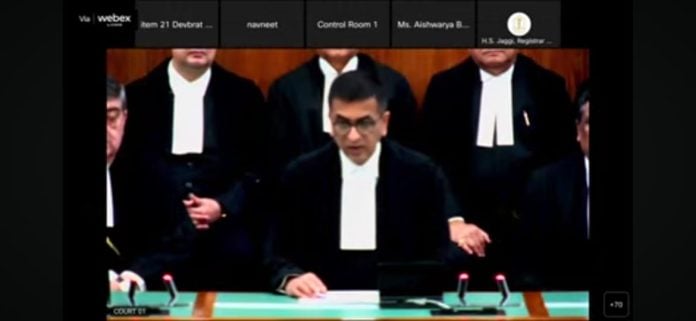Chief Justice of India D.Y. Chandrachud on Saturday said that the legislature was open to enact a fresh law, if it found deficiency in a Supreme Court order, but directly overruling a judgement was completely impermissible.
Responding to the recent pattern of the legislature passing laws to overrule the mandate of recent judgments of the Supreme Court, the CJI said there was a dividing line between what the legislature could do and what it cannot do.
If a judgement pointed out a deficiency in the law, the legislature could enact a fresh law to cure the deficiency. However, the legislature could not directly overrule an Apex Court verdict, he added.
Speaking during the Hindustan Times Leadership Summit 2023, the CJI said this was not happening for the first time. This had happened in the tax arena earlier. Validating acts was perfectly permissible, but directly overruling a judgement was completely impermissible, he noted.
He said while deciding a case, Judges did not look at how the society would react to the verdict, but rather followed constitutional morality.
Speaking about constitutional morality, the CJI said it consisted of those values of the Constitution which the courts were intended to espouse such as fraternity, human dignity, personal liberty and equality.
He further said that this was the exact difference between the elected arms of the government and the judiciary. While the elected arm of governance was intended to be responsive to the people, judges need to follow Constitutional morality, added the CJI.
He said the Supreme Court had recently heard some of the most difficult questions of its times.
As per the CJI, the Supreme Court judges did not profess to be right. They were final not because they were right, but they were right because they were final. However, this was no reason for the court to not answer the critical issues of this time.
The work done by the Apex Court was open to criticism and broader social dialogue, he added.
Listing three critical functions performed by the courts, the CJI said apart from deciding cases, the courts did a lot of work in their administrative capacity.
As per the CJI, the courts had become important platforms for social engagement, not just for the verdicts delivered by them, but for the space they created for dialogue between diverse segments of the society.
People felt that at least in courts, they would have space to exchange views and ideas and produce a new synthesis of change within the society.
Regarding the administrative work, he said one of the critical barriers to access to justice was language. The Supreme Court was in the process of translating its verdicts into various Indian languages using AI assisted tools. The Courts must reach out to people so that the people understand what was going on in their courts.
Calling the livestreaming of Apex Court proceedings as.part of the process of confidence building, the CJI said this would make sure that people had an element of trust in the work done by the top court of the country.
Regarding transcribing court proceedings, the CJI said work was in progress. He revealed that the Supreme Court website has been tweaked to make it more accessible to the visually-impaired.
He said the administrative work, coupled with the technology deployed in the judicial system, were efforts to democratise the access to justice, as well as create transparency and accountability in the work of the court.
Stating that the Indian Supreme Court was a court for the people, he said it was not just the highest constitutional court, but also the court of final appeal. In that sense, the Apex Court judges exercised a very wide jurisdiction as compared to other courts in the world.
Speaking about the US Supreme Court, he said it decides about 80 cases a year, but the Indian Supreme Court has already disposed of 72,000 cases this year with two more months to go. He said the figures gave a sense of difference in the work between the two Courts.
Regarding the age of retirement of judges, the CJI stated that it was important for the judges to retire. He said it was too much of a responsibility to cast on human beings, in terms of their own infallibility, by postulating that they should not retire. Judges were human beings, they were prone to error, societies must evolve, he added.
He said it was important to pass on the mantle to succeeding generations, who could point out errors of the past and rejig the social legal framework for the society to evolve.


